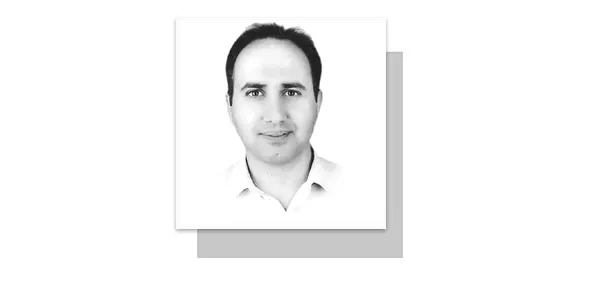THE collapse of a society rarely announces itself with a single, shattering blow.
More often, it arrives in whispers, in the quiet abandonment of duty, the slow death of public trust and the steady untying of the very institutions meant to hold a nation together.
Khyber Pakhtunkhwa today stands not at the edge of chaos, but knee-deep in a decay so familiar, so pervasive, that it risks becoming invisible, adrift in a perfect storm of neglect, fear and disintegration.
The warning signs are not subtle, they are imprinted across its political corridors, schoolyards, hospitals, police stations and even the haunted silence of its once-vibrant university classrooms.
While the province has historically borne the weight of conflict and sacrifice, from hosting millions of Afghan refugees in the wake of the 1980s Soviet invasion to facing the brunt of the war on terror in the 2000s, it now finds itself trapped not in open war, but in something far more insidious, a total collapse of governance and civic confidence.
The paralysis of leadership has not just slowed progress, it has reversed it.
Local government institutions, constitutionally mandated to bring decision-making closer to the people, lie dormant or powerless.
Elected local bodies either do not exist or are stripped of meaningful authority.
Instead of responding to citizens’ needs, the state machinery lurches from one administrative crisis to another.
Bureaucratic turnover is dizzying, key officials are transferred before policies even take root.
Budgets for development are repeatedly cut and when allocated, are either delayed or poorly executed.
Amid this vacuum, insecurity has resurfaced—not with past insurgencies’ ferocity but with the quiet confidence of militants sensing a distracted state.
Attacks on police and military convoys are rising, with TTP’s presence growing in Swat, Bannu, Bajaur, Tank and Waziristan.
The public, once hopeful for lasting peace, now lives under renewed fear.
No coherent counterterrorism strategy exists, nor is there a plan to restore morale.
Communities remain silent, afraid to speak out.
Simultaneously, KP’s social fabric is fraying.
Drug addiction, particularly meth (ice), is surging, especially among youth.
Addiction is rampant in towns, roadsides and even universities.
Yet, the province lacks a functional drug prevention policy, rehab centres, or awareness drives.
The roots are clear: widespread joblessness, hopelessness and social isolation are pushing youth towards addiction and extremism.
This twin crisis—of rising militancy and spiralling drug abuse—reflects a society in retreat, desperately in need of leadership, resources and direction to reclaim its future.
Social fragmentation is becoming more pronounced as economic pressures and cultural rigidity create a hostile environment, especially for women.
The province’s young population, once seen as a demographic dividend, now appears increasingly as a ticking time bomb.
The formal economy cannot absorb them and the informal sector offers little more than exploitation.
Opportunities for vocational training are woefully inadequate or irrelevant to market needs.
Many students graduate into unemployment and those who have the means are migrating to other provinces or countries, leaving behind a gaping hole in KP’s human capital base.
Equally alarming is the decay of public universities in the province, once beacons of critical thought and social mobility, they are now starved of funding, morale and purpose.
Many have failed to pay faculty salaries on time, leading to frequent strikes and academic paralysis.
Research has stalled, departments are being downsized and essential academic programs are vanishing.
Students find themselves burdened with rising tuition fees, declining standards and a growing realization that their degrees offer little in terms of security or opportunity.
The crisis is further compounded by the absence of permanent vice chancellors in several key universities, positions left vacant for years due to political meddling.
In some cases, even the physical assets of universities are being quietly sold off, piece by piece, as financial mismanagement eats away at what little remains of their autonomy and integrity.
The Higher Education Commission, weakened at the federal level, has not succeeded in coordinating with the province to create a sustainable funding model or quality assurance framework.
As a result, KP is not just losing its present, it is forfeiting its future.
The KP Police, once hailed as a symbol of reform after the 2009 conflict era, now struggles under the weight of neglect and decay.
Underpaid, undertrained and frequently politicized, the force faces low morale and outdated tools while contending with modern threats like cybercrime and drug networks.
Once seen as a line of defence, the police are increasingly viewed as yet another failing institution.
Meanwhile, climate change is redrawing KP’s map, floods, droughts and erratic weather are displacing thousands, forcing rural populations into overcrowded cities.
Urban centres like Peshawar are overwhelmed, unable to provide basic needs such as housing, water, or security.
Crime rises as desperation deepens.
The list of crises is long, law & order, weak governance, power outages, political paralysis, but the urgency for change is even greater.
The KP government must act, it must govern as an ally of the people.
KP has suffered enough, what’s left must be protected, renewed and uplifted before it slips beyond saving.
—The writer is PhD in Political Science, and visiting faculty at QAU Islamabad. (zafarkhansafdar@yahoo.com)


















